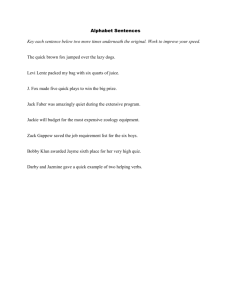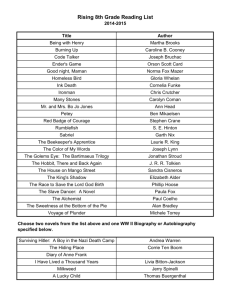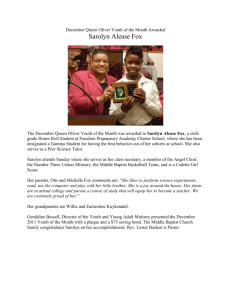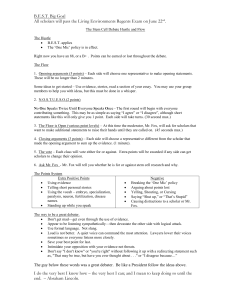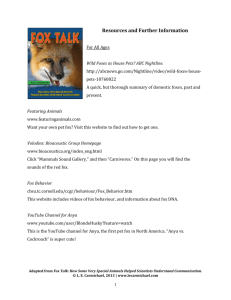Theme Stations
advertisement
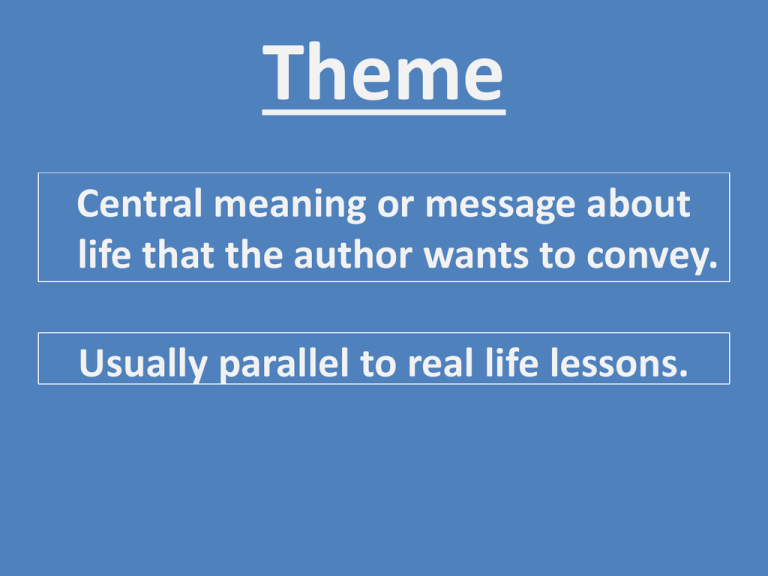
Theme Central meaning or message about life that the author wants to convey. Usually parallel to real life lessons. Mini-Lesson: Theme • The story’s central message. • The theme of a fable is it’s moral. The theme of a parable is it’s teaching. The theme of a piece of fiction is it’s view about life and how people behave. The Ant and the Grasshopper In a field one summer's day a grasshopper was hopping about, chirping and singing to its heart's content. A group of ants walked by, grunting as they struggled to carry plump kernels of corn. "Where are you going with those heavy things?" asked the grasshopper. Without stopping, the first ant replied, "To our ant hill. This is the third kernel I've delivered today." "Why not come and sing with me," teased the grasshopper, "instead of working so hard?" "We are helping to store food for the winter," said the ant, "and think you should do the same." "Winter is far away and it is a glorious day to play," sang the grasshopper. But the ants went on their way and continued their hard work. The weather soon turned cold. All the food lying in the field was covered with a thick white blanket of snow that even the grasshopper could not dig through. Soon the grasshopper found itself dying of hunger. He staggered to the ants' hill and saw them handing out corn from the stores they had collected in the summer. He begged them for something to eat. "What!" cried the ants in surprise, "haven't you stored anything away for the winter? What in the world were you doing all last summer?" "I didn't have time to store any food," complained the grasshopper; "I was so busy playing music that before I knew it the summer was gone." The ants shook their heads in disgust, turned their backs on the grasshopper and went on with their work. The Fox and the Grapes ONE hot summer’s day a Fox was strolling through an orchard till he came to a bunch of Grapes just ripening on a vine which had been trained over a lofty branch. “Just the things to quench my thirst,” said he. Drawing back a few paces, he took a run and a jump, and just missed the bunch. Turning round again with a One, Two, Three, he jumped up, but with no greater success. Again and again he tried after the tempting morsel, but at last had to give it up, and walked away with his nose in the air, saying: “I am sure they are sour.” Steps for finding the theme. 1. Decide what the main topics of the story are. Try to choose the two most important ones. – – – – – – – – – – – – – Friendship Courage Hope Trust Justice Violence Race-relations Love Freedom Childhood Survival Growing up Family 2. Using the two topics, try to decide what important message the author of the text is trying to send relating to those topics. For example, if the story you are reading is mostly about friendship and courage, using evidence from the text, you may decide that the theme is “Friendship can give you the courage to try things that you were once too scared to try.” You will rotate through 5 stations. At each station, read the fable/story with your group and complete the chart in your journal. Title of Fable/Story 1) 2) 3) 4) 5) 2 Main Topics Theme 1) The Crow and the Pitcher A CROW perishing with thirst saw a pitcher, and hoping to find water, flew to it with delight. When he reached it, he discovered to his grief that it contained so little water that he could not possibly get at it. He tried everything he could think of to reach the water, but all his efforts were in vain. At last he collected as many stones as he could carry and dropped them one by one with his beak into the pitcher, until he brought the water within his reach and thus saved his life. 2) The Hare With Many Friends A Hare was very popular with the other beasts who all claimed to be her friends. But one day she heard the hounds approaching and hoped to escape them by the aid of her many Friends. So, she went to the horse, and asked him to carry her away from the hounds on his back. But he declined, stating that he had important work to do for his master. “He felt sure,” he said, “that all her other friends would come to her assistance.” She then applied to the bull, and hoped that he would repel the hounds with his horns. The bull replied: “I am very sorry, but I have an appointment with a lady; but I feel sure that our friend the goat will do what you want.” The goat, however, feared that his back might do her some harm if he took her upon it. The ram, he felt sure, was the proper friend to apply to. So she went to the ram and told him the case. The ram replied: “Another time, my dear friend. I do not like to interfere on the present occasion, as hounds have been known to eat sheep as well as hares.” The Hare then applied, as a last hope, to the calf, who regretted that he was unable to help her, as he did not like to take the responsibility upon himself, as so many older persons than himself had declined the task. By this time the hounds had caught the Hare, and tore him to shreds. 3) The Mule in the Lion’s Skin An Mule once found a Lion’s skin which the hunters had left out in the sun to dry. He put it on and went towards his native village. All fled at his approach, both men and animals, and he was a proud Mule that day. In his delight he lifted up his voice and brayed, but then every one knew him, and his owner came up and gave him a sound pounding for the fright he had caused. And shortly afterwards a Fox came up to him and said: “Ah, I knew you by your voice.” 4) The Fox and the Goat A fox one day fell into a deep well and could find no means of escape. A Goat, overcome with thirst, came to the same well, and seeing the Fox, inquired if the water was good. Concealing his sad plight under a merry guise, the Fox indulged in a lavish praise of the water, saying it was excellent beyond measure, and encouraging him to descend. The Goat, mindful only of his thirst, thoughtlessly jumped down, but just as he drank, the Fox informed him of the difficulty they were both in and suggested a scheme for their common escape. “If,” said he, “you will place your forefeet upon the wall and bend your head, I will run up your back and escape, and will help you out afterwards.” The Goat readily assented and the Fox leaped upon his back. Steadying himself with the Goat’s horns, he safely reached the mouth of the well and made off as fast as he could. When the Goat upbraided him for breaking his promise, he turned around and cried out, “You foolish old fellow! If you had as many brains in your head as you have hairs in your beard, you would never have gone down before you had inspected the way up, nor have exposed yourself to dangers from which you had no means of escape.” 5) The Fox and the Cat A Fox was boasting to a Cat of its clever devices for escaping its enemies. "I have a whole bag of tricks," he said, "which contains a hundred ways of escaping my enemies." "I have only one," said the Cat; "but I can generally manage with that." Just at that moment they heard the cry of a pack of hounds coming towards them, and the Cat immediately scampered up a tree and hid herself in the boughs. "This is my plan," said the Cat. "What are you going to do?" The Fox thought first of one way, then of another, and while he was debating the hounds came nearer and nearer, and at last the Fox in his confusion was caught up by the hounds and soon killed by the huntsmen. Journal Entry • From what we have discussed, answer today’s Essential Question in your journal. • Summarize what your learned. How do I determine and analyze the theme of a text? Answers 1) If at first you don't succeed, try and try again. • The crow might have died if he had given up, but he persisted and through his ingenuity was able to succeed. 2) It is better to have a few good friends than many superficial ones. • The hare believed she had many friends, but when it mattered she had none. 3)Don’t pretend to be something that you are not. • The Mule was ridiculed and scolded for pretending to be something else. 4) Think things through before taking action. Don't be impulsive. • The goat should have considered his escape route before jumping in the hole to die. 5) It is better to do one thing right than a hundred things incorrectly. • The fox was killed because of his indecision.
